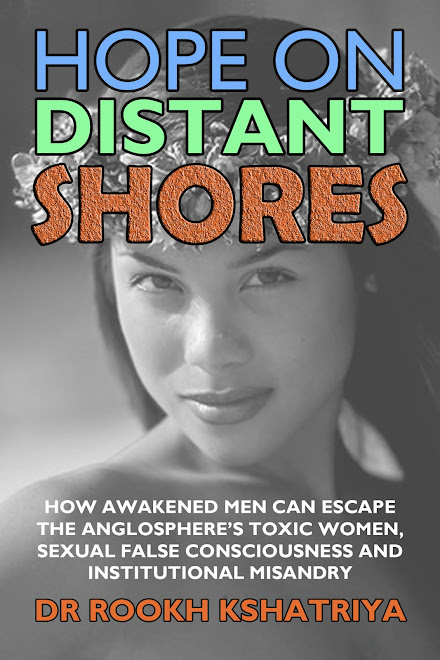As is generally known, my own contribution to gender-theory lies in the
cultural sphere. In sum, I do not consider feminism to be a ‘revolutionary’
theory, at all – rather, I have shown that most of the core feminist themes were already present
in Anglo-Saxon culture long before ‘feminism’ ever existed. For example,
feminist views on porn, prostitution and ‘trafficking’ resemble the views of
Christian conservatives, not the liberal left. The residual puritan influence
on Anglo-Saxon nations specifically explains why this is so. By keeping sex a scarce
commodity, this latent Puritanism has given Anglo-American feminism a strong misandrist agenda and facilitated its expansion into every sphere of life.
However, the following article about young black guys in the UK got me thinking:
Islam's ability to empower is a magnet to black British youths
A seminar was hosted last month by Christians Together in England to consider ways to "stem the flight of black British youths to Islam and radicalisation". In an unprecedented move, Muslims were invited to attend – and they did. Together, both faith groups discussed the reasons why a growing number of young black people are choosing Islam in preference to Christianity. According to this morning's BBC Radio 4's Today programme, one in nine black Christian men are converting to Islam.
Following in my father's footsteps, I was raised as a Roman Catholic and attended Sunday mass regularly as a child. I also attended a Roman Catholic secondary school – initially a cultural shock as I found myself the only black student among a predominantly white class. The religious focus of the school was, however, a refreshing contrast to my urban, street background. Teachers and students were more serious about God than at my previous schools. A student was not considered "nerdy" or "odd" due to their religiosity. I was therefore able to excel in religious studies and was successful in my final O-level exam...
During these lessons, the more we learned about religion, the more we questioned and challenged particular concepts, particularly relating to Christianity. Questions about the concept of the trinity – the Godhead being three in one – caused many debates as some of us; myself and others did not find this logical or feasible. Our religious studies teacher became exasperated by persistent questions on this topic, and arranged for the local priest to attend and address the question. His explanations did little to remove our doubts in this very fundamental and important area of faith.
I recall one particular lesson where we were doing Bible studies and I queried why we, as Christians, failed to prostrate in the same manner that Jesus had in the garden of Gethsemane prior to his arrest. I was unable to identify any relationship between Jesus's prayer and ours as his Christian followers. However, the Muslim prayer most closely resembled Jesus's.
After leaving school, I lost contact with most of my school friends. I also abandoned many aspects of Christianity and instead submerged myself into the urban street culture of my local friends and community – we would make our own religion based on the ethics and beliefs that made sense to us.
The passivity that Christianity promotes is perceived as alien and disconnected to black youths growing up in often violent and challenging urban environments in Britain today. "Turning the other cheek" invites potential ridicule and abuse whereas resilience, strength and self-dignity evokes respect and, in some cases, fear from unwanted attention.
I converted to Islam after learning about the religion's monotheistic foundation; there being only one God – Allah who does not share his divinity with anything. This made sense and was easy to comprehend. My conversion was further strengthened by learning that Islam recognised and revered the prophets mentioned in Judaism and Christianity. My new faith was, as its holy book the Qur'an declares, a natural and final progression of these earlier religions. Additionally, with my newfound faith, there existed religious guidelines that provided spiritual and behavioural codes of conduct. Role models such as Malcolm X only helped to reinforce the perception that Islam enabled the empowerment of one's masculinity coupled with righteous and virtuous conduct as a strength, not a weakness.
My personal experiences are supported by academic research on the same topic: Richard Reddie, who is himself a Christian, conducted research on black British converts to Islam. My own studies revealed that the majority of young people I interviewed converted from Christianity to Islam for similar reasons to me. Islam's way of life and sense of brotherhood were attractive to 50% of interviewees, whereas another 30% and 10% respectively converted because of the religion's monotheistic foundations and the fact that, holistically, the religion "made sense" and there were "no contradictions".
My research examined whether such converts were more susceptible to violent radicalisation or more effective at countering it. The overwhelming conclusion points to the latter – provided there are avenues to channel these individuals' newly discovered sense of empowerment and identity towards constructive participation in society, as opposed to a destructive insularity which can be exploited by extremists.
Many Muslim converts – not just black British ones – will confirm the sense of empowerment Islam provides, both spiritually and mentally. It also provides a context within which such individuals are able to rise above the social, cultural and often economic challenges that tend to thwart their progress in today's society. Turning the other cheek therefore is never an option.
Abdul Haqq Baker: The UK Guardian, August 2013
In the light of these arguments, a question occurred to me: could the
ultimate origins of misandrist feminism be Christianity itself? After all, the
puritan strain of Christianity is still a form of Christianity. Moreover,
feminism flourishes above all in the Christian West, not in Muslim, Hindu or
Buddhist lands.
 |
| Jesus has always been a big 'hit' with women |
Examination of Christianity’s turbulent history supports this view. Its
cringing emotionalism has always appealed to the passive female mind. Many of Jesus’ followers were, supposedly,
women. Even today, women outnumber men in Christian congregations. The earliest
Christian martyrs were whimpering, asexual masochists, not bold warriors. Indeed,
the Roman Catholic Church still seems fixated on murdering male sexuality.
Monks and priests are expected to repress all sexual self-expression, a course
not only misandrist but deeply damaging to the individuals concerned.
Even more telling, scholars have raised valid questions about the sexual orientation of Jesus, St Paul and other important Christians. An impartial observer would have to say that their frantic asexuality quite possibly concealed carnal drives of the most disordered kind. Indeed, a huge proportion of modern Christian clergy are homosexuals or paedophiles, especially those within the Catholic Church and the Evangelical movement.
Even more telling, scholars have raised valid questions about the sexual orientation of Jesus, St Paul and other important Christians. An impartial observer would have to say that their frantic asexuality quite possibly concealed carnal drives of the most disordered kind. Indeed, a huge proportion of modern Christian clergy are homosexuals or paedophiles, especially those within the Catholic Church and the Evangelical movement.
 |
| Christ is often represented in art as feminine or asexual |
As the article opines, Christianity has little to offer men beyond submission, passivity and sexual repression. It is also noteworthy that the United States is both the most feminist and the most overtly Christian nation in the western world. The limp resistance offered by Western men to feminism also owes much to Christianity. While Muslim women who defy male authority are scarred with acid, lashed or beheaded, Anglo-American men ‘turn the other cheek’ even while their rights, assets and lives are stripped from them.
 |
| He sure did... |
My posts are speculative thought-pieces about feminism in the Anglosphere, nothing more. As an atheist, I do not hold Hindu or Muslim beliefs any ‘higher’ than Christian ones. However, it seems self-evident that Western Christianity shows a deep historical tendency to pedestalise women and exalt passive, distinctively ‘feminine' values. In particular, it holds misandrist (and entirely fanciful) notions about the dynamic, life-enhancing force that is male sexuality.
 |
| Jesus: An Asexual Icon |
Certainly, no healthy male could long endure the asexual/celibate ‘ideal’ extolled by Christianity. Indeed, the Roman Catholic Church has much in common with feminism in its hatred of male sexuality and preoccupation with asexual gender-relations. It could even be said that Anglo feminism is a form of secular Neo-Christianity. For all their faults, at least Judaism and Islam deal with men as men, the true sign of a ‘masculine’ faith. As always in the Anglosphere, the gulf between feminist ‘revolution’ and ‘traditional’ western values is disquietingly small.
 |
| Radfems or early Christians? |















